A “Final Warning” on Climate
by Gary Gardner
Last week the Intergovernmental Panel on Climate Change (IPCC) issued what Greenpeace International called the “final warning” in the global effort to limit warming to 1.5 degrees Celsius (2.7° Fahrenheit) above preindustrial levels. After three decades of increasingly insistent wake-up calls, the Panel laid out the sobering reality: Meeting the temperature goal set by the global community in 2015 is impossible without an immediate response, “a quantum leap in climate action,” in the words of United Nations Secretary General Antonio Guterres. Without such action, the rise in temperature could surpass the 1.5 degree threshold before the release of the next assessment report.

Time to stop (Kelly Sikkema on Unsplash)
Given humanity’s dismal track record in addressing the climate crisis, the prospects for mustering the needed response can only be described as quite poor. This is puzzling: We are not a suicidal species, and polls show that people generally want to protect the environment. What stands in the way of rapid, assertive action on climate and other sustainability issues? What is needed to turn the situation around?
In the Driver’s Seat
Perhaps the single largest obstacle to climate action is the political power of industries determined to perpetuate fossil fuel use. They wield influence through their funding of political campaigns, which essentially allows them to purchase the votes of legislators. A 2020 Senate report documented the role of fossil fuel interests in blocking serious climate legislation for decades, by employing tactics similar to those used by the tobacco lobby to block restrictions on tobacco.
The report demonstrates that the industry has known for decades of the threat of fossil fuels to the climate. At a 1959 conference organized by the American Petroleum Institute, renowned physicist Edward Teller laid out clearly the likely consequences of continued burning of fossil fuels. This was followed by decades of research, often by oil companies’ own scientists, that projected the impact of carbon dioxide on climate.
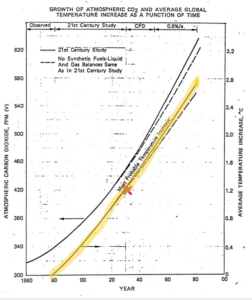
Exxon knew. (Climate Files, color annotations by CASSE)
In 1982 Exxon predicted that the atmospheric concentration of CO2 could rise to double its preindustrial level, pushing global temperatures higher. Indeed, the “Most Probable Temperature Increase” chart taken from a 1982 internal Exxon memo projected rising average global temperatures (the highlighted line in the chart) based on expected increases in atmospheric concentrations of CO2—partly, of course, from burning Exxon products. Lo and behold, in 2023 concentrations of CO2 and the temperature increase over preindustrial times track closely with the 1982 Exxon projections (the red X in the chart).
In other words, major fossil fuel companies knew the harm they were creating, yet chose to hide this reality to protect profits. The industry could have acted responsibly, say, by shifting their core business to renewable forms of energy. Instead, they organized what the Senate report called “a political covert operation against their own country,” creating disinformation campaigns to preserve the place of fossil fuels in the U.S. economy. Little wonder, then, that climate action has been slow to develop, even in the face of growing climate chaos.
Napping in the Back Seat
Even as corrupt corporate interests wield major power over the climate, another power center—the collective citizenry—is primed for environmental protection, yet relatively inactive. Gallup, the polling organization, has produced a snapshot of U.S. public opinion on the environment in 2022 that suggests a populace very concerned about the environment:
- 53 percent say they are dissatisfied or very dissatisfied with the state of the environment.
- 71 percent worry about the state of the environment a great deal or a fair amount.
- 75 percent believe the overall quality of the environment is fair or poor.
- 59 percent believe the quality of the environment is getting worse.
Americans also expressed concern in 2022 over specific environmental issues, at even higher rates, as shown in the table.
|
Issue |
Percent who worry “a great deal” or “a fair amount” about the issue (%) |
| Pollution of rivers, lakes and reservoirs | 83 |
| Air pollution | 75 |
| Loss of tropical rain forests | 73 |
| Global warming or climate change | 65 |
| Pollution of drinking water | 83 |
| Extinction of plant and animal species | 70 |
| Ocean and beach pollution | 81 |
The numbers are equally solid on the climate crisis: 78 percent believe that global warming is a critical or important threat to US vital interests, 65 percent believe it is caused by human activities, and 60 percent believe it is already happening. In sum, Americans’ interest in the broad range of environmental issues reaches levels that would typically catch political leaders’ attention.
Despite their concern for the environment, Americans appear to lack a sense of urgency about protecting it. Most respondents (54 percent) believe global warming will not affect them or their way of life in their lifetimes. This could be because the issue seems distant: Two-thirds said that extreme weather has not affected them personally. In sum, climate change, while a serious concern for most Americans, is still an abstraction rather than a regular experience, the near-daily news of climate disasters notwithstanding.
Notably, however, the share who believe climate change will affect them in their lifetimes is growing, from just a quarter of respondents in 1997 to approaching half (45 percent) in 2022. If the frequency and severity of climate disasters increases as predicted, the political saliency of the issue is likely to increase as well.
Downgrade Growth?
A few tidbits of the Gallup data suggest that Americans are open to the idea that the broad range of environmental challenges have a common root: economies that undervalue environmental goods and services.
When asked whether environmental protection should be prioritized over economic growth, 53 percent said yes, while 42 percent favored a focus on economic growth. And when asked if the environment should be protected even at the cost of limiting US production of oil, gas, coal, and other energy, half of respondents in 2022 said yes, compared to 46 percent who thought energy development should be the priority. Meanwhile, a slight majority (54 percent) worry a fair amount or a great deal about urban sprawl and loss of open spaces. These data suggest some openness to downgrading the importance of economic growth.
But that openness appears to have shrunk over time. In the 1980s and 1990s, Americans strongly prioritized environmental protection over economic growth, by a margin of roughly two to one. That support for environmental protection has softened substantially in the past two decades. (And it reversed in the years following the 2009 Great Recession as concern about the nation’s economic health grew.) Still, the bottom line is that a majority of Americans at least profess to prioritize environmental protection over economic growth.
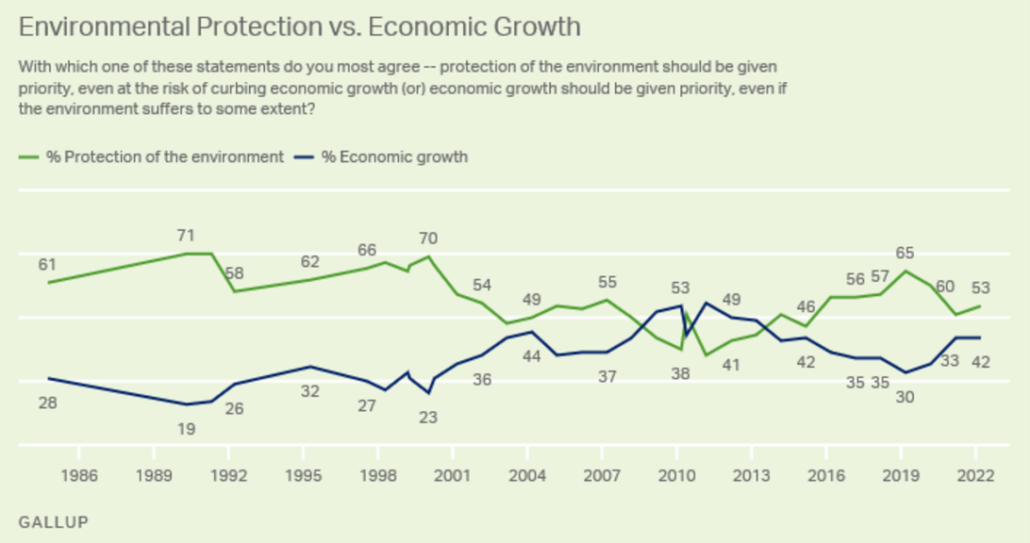
Would that the majority ruled. (Gallup)
Engaging a Sleeping Citizenry
So we have a “final warning” on the climate crisis, an industry committed to ignoring that warning, and a sleeping giant with an interest in heeding the warning. How can we help a citizenry for whom climate change and other sustainability challenges are abstractions to feel them, and to imagine constructive solutions? The Gallup data offers a few clues, especially regarding the need to to ground environmental challenges in people’s daily lives. I would love to hear readers’ thoughts on how to do this.
Here are a few ideas to prime the pump.
Bring home the costs—Studies documenting the economic costs of a degraded environment often use global numbers, or share of GDP, that are meaningless to an individual’s budget. These costs would more effectively prompt a political response if expressed at the household level. An example: Yesterday I learned that our condo fee will jump by nearly 10 percent because heavy rains have flooded basements in several units, leading to a sharp increase in insurance rates for the condo association. If the association labeled the dues increase a “climate damage fee,” the global climate challenge would suddenly become a personal financial challenge for many residents. That would grab their attention.
Provide truth in weather forecasting—Similarly, imagine if weather forecasters regularly identified the climate roots of extreme weather events. In 2022 the nonprofit Climate Central introduced the Climate Shift Index, which reveals the degree to which forecast weather is affected by climate change. “The temperatures we’re experiencing today are five times more likely [because of] climate change,” is how a forecaster in Houston made use of the Index. Regular, factual communication of this type (call your local TV station) would help drive home the reality of climate change and indirectly, the need for action on it.
Demand engaged leadership—Media outlets are captivated by examples of lifestyle leadership by luminaries such as Secretary of Transportation Pete Buttigieg, who cycled to his first Cabinet meeting, and environmentalist actor Ed Begley, Jr., who has travelled to the Oscars various years by metro, bicycle, and solar-powered electric car. Imagine if leaders across society—political leaders, entertainers, spiritual leaders—were modeling environmentally friendly behavior, and having fun doing it. Such leadership could be powerful.
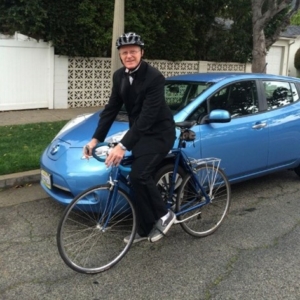
Follow the leader. (Ed Begley)
Go virtual if that’s what it takes—Imagine virtual reality (VR) technology being used to bring climate change home for those who have not experienced extreme weather events. Immersive virtual reality (VR that uses a headset) can be especially effective. For example, researchers placed participants in a virtual forest to illustrate around them the effect of selective tree removal. Such education could fit naturally in schools, but adults would benefit as well. What if local libraries, civic associations, and municipal governments sponsored briefings and civic events to allow local residents to understand the reality of unexpected flooding, wildfires, or extreme heat or cold?
These are just a few ideas for awakening a distracted public regarding the emergencies we face. You and other readers may have better ones. No single initiative will be enough to keep emissions below the 1.5 degree boundary. But our collective ideas could lay the groundwork for re-inflating the political posture of a citizenry long shriveled by corrupt corporate political practices.
A politically revived populace could assume its proper place as an effective counterweight to the political heft of corrupt corporations. Indeed, awakened citizens’ first order of business could be electoral reform that removes the influence of corporate money from the democratic process. In this way, citizens could demand timely action to address existential issues like climate change, avoiding any need for a “final warning.”
 Gary Gardner is Managing Editor at CASSE.
Gary Gardner is Managing Editor at CASSE.
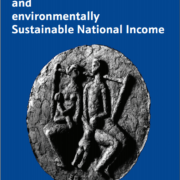
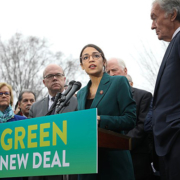


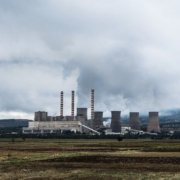


Of all the measures presented in the article to awaken the “sleeping citizenry”, bringing home the costs seems strongest. However, politicians are afraid to do this because it could cause them to lose an election. Some people will see that Elon Musk and Jeff Bezos can fly into space, causing more emissions than entire cities, and they ask, Why should I bear the costs? Such was the trigger of the Yelllw Vest movement in France. Anecdotally, I can say that many people see aeolians, solar farms and electric cars and are lulled into thinking that these measures are going to solve the problem.
Thanks, Mark. Would love to see a well-developed philosophy of the proper use of technology, a la EF Schumacher, Appropriate Technology movement, and your forthcoming </If Thoreau Had a Bike. Technology that benefits humanity within boundaries set by nature. We will get there, whether forced to or by choice.
Earth, the only known living planet among our universe of 200 sextillion stars. If you wanted to count them that’s about 10000 stars to look at every second of your life, and those are the stars just for you, your 8 billion fellow earthlings also have that many each to count.
And among all those stars, Planet Earth, our life provider,. It is special and so are we.
We need to change our ways and priorise looking after the place, myself included.
Let’s not do a Nauru. It’s a small Pacific Island with 10000 or so inhabitants, originally had life providing topsoil and beauty. Suffering a torrid history of conquest, the topsoil has been scraped away, the island strip mined to destruction – for its phospate. Nothing sustainable was left to live on.
In the recent past, its habitants just doing their best for survival, hustled payments from China Russia and Taiwan, traded their nation states’ allegiance on worldly issues.
With these funds depleted the islanders have since turned to providing migrant centres, holding refugees on the barren island for money and imports, from their Australian neighbours.
Gdp growth has long since sailed, total destruction left behind.
We all need to change our ways, together with a cultural shift.
We don’t wear fur anymore, we associate it with the blood of innocent animals. We need to become similarly emotive on environment. Coming from a typical family, let’s not be hypocritical, flying for a family holiday is the norm – alongside the sunny pristine boardwalk I see a solitary graffiti daubed, ‘eco criminals’, Guilty as charged and conscience stabbed – rehabilitation the only option. No real damage to my personal reputation, sure didn’t such n such fly to Greece n so and so go on business class to Dubai. The graffiti writer is right, I / we need to embed in our group conscience that eco harm is criminal, abhorrent like animal cruelty for fur. The Nauru people will eventually move to another island. There is no other Earth for us.
Amen. Beautiful statement. “Rehabilitation” is the right word. I would add, “Empowerment”.
Thanks, Conor. Agree with the need for a culture shift. Funny thing about culture shifts: they look scary, undesirable, and politically impossible on this side of them, but once we cross over we often see that the transition need not have been any big deal, and we wish we’d made the leap much earlier. How can we communicate that truth more convincingly, to persuade us all to do what needs to be done before we’re forced to?
@Gary, that powerful question focuses my attention. I believe culture change is doable. A culture of everyone doing my best for Earth can be nurtured. DMBee maybe a brand. (Patagonia is an established brand, I expect several different brands would work well appealing to different personality types.
To achieve this there firstly needs to be a clear brand vision. There is a lack of clear vision for solving Earth’s challenges. We need a defined set of steps, to a better way, for us to imagine our way to the journeys end.
With an end in mind we can start the journey. A clear believable achievable plan.
Culture change can strategically be nourished.
It’s all about being accepted and belonging, not feeling like the odd one out.
In a four person family one person may be motivated. If the three others are not, the one will feel isolated and family culture won’t change.
Its about establishing or redefining existing visible brands so that that one can feel part of a tribe. The motivated one then can have a DMBee badge on a schoolbag, sticker on a car window. By seeing this around like a Nike swoosh, psychologically that person feels part of a group – supported. When the others at home see the brands on other peoples cars or clothes, psychologically they feel left out of the group, they then want to join in.
Branding enables people to feel in a group, their values then align with the brand values and good things can happen. Rogue brands with dangerous values can align values in a bad way, all our human natures are susceptible.
I recall branding being a casse discussion. Vw based in Woltsberg has several brands. An idea is to have several brands based in ‘Steady State’ Maybe DMBee appealing to most people doing their best, not perfect, busy moms trying to recycle and support reuse charity shops.
People who like trucks n guns are won over with images of strong trucks up to performing in adverse elements. ‘Survive’ might appeal as a brand to align with.